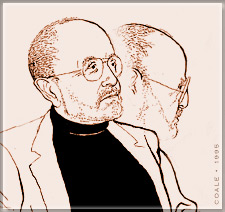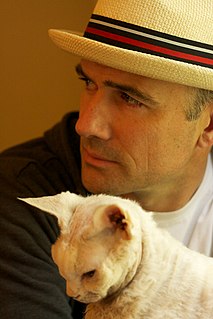A Quote by Lawrence M. Krauss
Occam's razor suggests that, if some event is physically plausible, we don't need recourse to more extraordinary claims for its being. Surely the requirement of an all-powerful deity who somehow exists outside of our universe, or multiverse, while at the same time governing what goes on inside it, is one such claim. It should thus be a claim of last, rather than first, resort.
Related Quotes
The Christian claim is: Nothing explains the facts better than an all-powerful, all-knowing, omnipresent god creating the universe and sending Jesus to spread his message. This is about as remarkable a claim as could be stated, and yet it is tossed out lightly. Christians seem to imagine that "God did it" is as plausible as the natural explanation that stories grow with the retelling. The Christian has the burden of proof, and it's an enormous burden given this enormous claim.
And this shows that people want to be stupid and they do not want to know the truth. And it shows that something called Occam's razor is true. And Occam's razor is not a razor that men shave with but a Law, and it says: Entia non sunt multiplicanda praeter necessitatem. Which is Latin and it means: No more things should be presumed to exist than are absolutely necessary. Which means that a murder victim is usually killed by someone known to them and fairies are made out of paper and you can't talk to someone who is dead.
To claim that science and religion pose different questions to the world is not to suggest that if the bones of Jesus were discovered in Palestine, the pope should get himself down to the dole queue as fast as possible. It is rather to claim that while faith, rather like love, must involve factual knowledge, it is not reducible to it.
If I ask you who is the most famous scientist who ever lived, or the greatest scientist who ever lived you'll say either Einstein or Newton or something like that because their claims were supposed to apply universally. But the claim of somebody who is studying a particular feature of the evolutionary process like whether it's very fast or very slow, or occurs in steps and so on, that's not a universal claim, that's a rather specialised claim and so you can't claim to great fame and great success.
It is certain that success naturally confirms in us a favourable opinion of our own abilities. Scarce any man is willing to allot to accident, friendship, and a thousand causes, which concur in every event without human contrivance or interposition, the part which they may justly claim in his advancement. We rate ourselves by our fortune rather than our virtues, and exorbitant claims are quickly produced by imaginary merit.
I distrust summaries, any kind of gliding through time, any too great a claim that one is in control of what one recounts; I think someone who claims to understand but is obviously calk, someone who claims to write with emotion recollected in tranquility, is a fool and a liar. To understand is to tremble. To recollect is to re-enter and be riven. ... I admire the authority of being on one's knees in front of the event.
There is an appearance of humility in the protestation that the truth is much greater than any one of us can grasp, but if this is used to invalidate all claims to discern the truth it is in fact an arrogant claim to a kind of knowledge which is superior to [all others]...We have to ask: 'What is the [absolute] vantage ground from which you claim to be able to relativize all the absolute claims these different scriptures make?





































